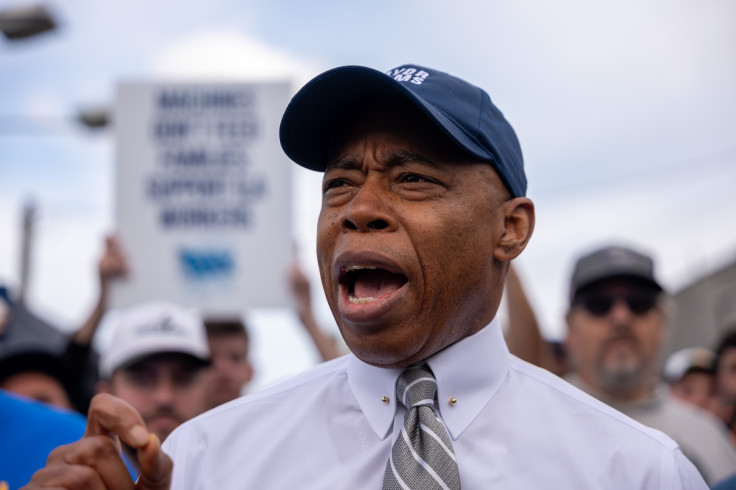
New York City was once one of the nation's largest immigration proponents, passing expansive sanctuary city laws and becoming home to over 500,000 undocumented immigrants. But as its mayor Eric Adams is seemingly cozying up with President-elect Donald Trump amid their legal woes, the once safe haven may now become a supporter of his plans to conduct mass deportations.
Earlier this week, Adams announced he wants migrants in the city who are charged with crimes to be deported from the US without waiting to see if they are convicted. He cited a concern for New Yorkers safety, including law-abiding migrants, as a reason for his support.
"Well, cancel me because I'm going to protect the people of the city," Adams said at a Tuesday press conference. "And if you come into this country, in this city, and think you're going to harm innocent New Yorkers and innocent migrants and asylum seekers, this is not the mayor you want to be in the city under."
At that same conference, he incorrectly claimed that undocumented immigrants are not entitled to the right of due process under the U.S. Constitution. The reality is that regardless of immigration status, many of the rights in the Constitution, including due process and legal counsel, apply to everyone in the U.S. In deportation proceedings, those rights are more limited; there is no presumption of innocence, for instance.
"The Constitution is for Americans," Adams said. "I'm not a person that snuck into this country. My ancestors have been here for a long time."
The Mayor's rhetoric is a clear departure from the city's tradition of safeguarding migrants.
Sanctuary laws for immigrants in New York City have been in place for decades. In fact, New York City mayors going back to Ed Koch, who was in office from 1978 to 1989, have pointed to sanctuary policies to encourage immigrants to use city services, such as hospitals, schools and police without fear of deportation, according to Gothamist.
Those laws were expanded in 2014 under Mayor Bill de Blasio, when he passed a law that ensured undocumented individuals accused of crimes would be given due process prior to deportation proceedings. City officials may turn over only those undocumented individuals who have been convicted of one of a list of 170 serious crimes within the last five years— and only when a judge has signed a warrant authorizing federal authorities to detain them.
Overall, the city's laws from 2014 to 2017 "essentially place strong limitations on the city's ability to cooperate or to provide even just notification to federal authorities," said chief counsel Lisa Zornberg back in February.
But Adams himself, a former NYPD captain, has never been too fond of these laws. In fact, he has been more vocal about his opposition this year, after Texas Gov. Greg Abbott began bussing and flying migrants en masse from Texas to sanctuary cities all over the country, including Washington, Chicago, Denver, and of course, New York City. That strategy overwhelmed reception services, strained resources and stoked social tensions in all of those cities, where tens of thousands of migrants arrived unannounced, according to El Pais.
Since then, Adams has called to scale back on those laws, saying they have gone "too far," and that "we should be able to address and coordinate with any entity when you're dealing with those who commit crimes in our city."
Now, as the President-elect is set to assume office in January, and doubles down on his promises to carry out the largest mass deportation operation in American history, it remains unclear how New York City will react.
Unlike other Democratic-led cities, Adams has not promised to "Trump-proof" New York and prevent Trump's mass deportations to hit the Big Apple. On the contrary, he has provided a shifting rhetoric on the matter.
On the day after the election, he reaffirmed that New York is a sanctuary city but sidestepped reporters' questions about whether he would actively resist federal deportation efforts. A week later, however, he seemingly changed his view, suggesting "we can be very helpful in how we address this issue in a very real way."
© 2025 Latin Times. All rights reserved. Do not reproduce without permission.




